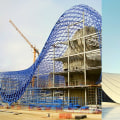Structural engineering is a highly specialized field that requires a unique set of skills and knowledge. To become a successful structural engineer, one must possess an analytical and mathematical mind, as well as expert problem-solving skills. Leadership, management, and strong interpersonal communication are also essential. Additionally, a solid understanding of physics and three-dimensional conceptual skills are necessary.
Structural engineers must be able to solve challenging technical problems through creative solutions and must be prepared to work with many different types of materials and structural systems, including concrete, steel, wood, and masonry. A bachelor's degree in civil engineering is the minimum requirement for this profession. Graduate studies can also be beneficial. Most engineers will specialize in one type of project or infrastructure, such as bridges or buildings.
Structural engineers are responsible for setting up structures, choosing the right building material, inspecting construction work, and ensuring the structural strength of buildings and structures. They must understand how structures work, why they were designed the way they were designed, how they carry loads, and where forces flow through them. There are pathways to a career in structural engineering for both college graduates and school leavers. To be successful in this field, structural engineers must be detail-oriented, creative, and possess incredible problem-solving skills.
They must also have a degree in civil or structural engineering accredited by the Institution of Structural Engineers. This course covers everything from the structure of the earth to seismic response of soils, foundations, and structures. Additionally, structural engineers must have fantastic project and budget management skills with a wealth of knowledge of construction processes, materials, and legal regulations. Structural engineers are primarily concerned with designing and constructing buildings and structures that are safe and able to withstand the elements to which they will be exposed.
They must also improve the structural integrity of existing buildings. The working hours of consulting structural engineers are typically office hours with some overtime to meet deadlines; engineers who work on-site tend to have more hours and work shifts.










